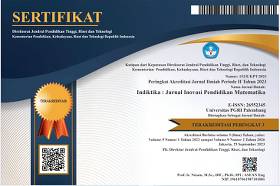PENINGKATAN KEMAMPUAN PENALARAN MATEMATIS MAHASISWA MELALUI PEMBELAJARAN REFLEKTIF BERBANTUAN APLIKASI MOODLE
DOI:
https://doi.org/10.31851/indiktika.v1i2.3034Abstract
Tujuan penelitian ini adalah untuk mengetahui peningkatan kemampuan penalaran matematis mahasiswa melalui pembelajaran reflektif berbantuan aplikasi Moodle. Penelitian ini merupakan penelitian deskriptif dengan desain one group pretest-postest design. Subjek dalam penelitian ini adalah 33 orang mahasiswa kelas III.B Program Studi Pendidikan Matematika Universitas PGRI Palembang Tahun Akademik 2017/2018. Data dikumpulkan melalui tes kemampuan awal dan tes kemampuan penalaran matematis. Analisis data dilakukan dengan deskriptif kuantitatif. Hasil penelitian menunjukkan bahwa peningkatan kemampuan penalaran matematis mahasiswa melalui pembelajaran reflektif berbantuan aplikasi Moodle berada dalam kategori sedang.
 Kata kunci : aplikasi Moodle, kemampuan penalaran matematis, pembelajaran reflektif
Â
This research purpose to investigate the enhancement of students’ mathematical reasoning ability through implementation of reflective learning with Moodle application. This research used quasi experimental design with one-group pretest-posttest design. The subject of this study was 33 students of class III.B Mathematics Education of Universitas PGRI Palembang Academic Year 2017/2018. Data were collected through test of initial mathematical ability and test of mathematical reasoning. Data in this study were analyze through descriptive quantitative. The result shown that the enhancement of students’ mathematical reasoning who received Reflective Learning model with Moodle application was in the medium category..
                                                      Keywords : moodle application, reflective learning, students’ mathematical reasoning
References
Ansjar, M. dan Sembiring. 2000. Hakikat Pembelajaran MIPA dan Kiat Pembelajaran Matematika di Perguruan Tinggi. Jakarta: Dirjen Dikti Depdiknas.
Armiati. 2011. Peningkatan Kemampuan Penalaran Matematis, Komunikasi Matematis dan Kecerdasan Emosional Mahasiswa Melalui Pembelajaran Berbasis Masalah. Disertasi tidak dipublikasikan. Bandung : Universitas Pendidikan Indonesia.
Baig, S. and Anjun H. 2006. Learning Mathematical Rules With Reasoning. Eurasia Journal of Mathematics, Science and Technology Education,Vol. 2(2) : 15-39.
Coughlan, A. 2007. Reflective Learning: Keeping a Reflective Learning Journal. [Online]. Tersedia : https://www.dcu.ie/sites/default/files/students/Reflectivelearning.pdf. [16 Desember 2016].
Dougiamas, M. 2011. Using Workshop Moodle 2.2. [Online]. Tersedia : http://docs.moodle.org/22/en/Using_Workshop. [ 13 Desember 2016].
Godwin-Jones, B. 2003. Tools for Distance Education: Towards Convergence and Integration. Language Learning & Technology,Vol. 7(3) : 18-22.
Hake, R. 1999. Analizing Change/gain Scores. [Online]. Tersedia : http://www.physics.indiana.edu/-sdi/AnalyzingChange-Gain.pdf.html. [ 13 Desember 2016].
Herrington, T., Herrington, J., Oliver, R., and Omari, A. 2000. A Web-based Resource Providing Reflective Online Support for Preservice Mathematics Teachers on School Practice. Contemporary Issues in Technology and Teacher Education, Vol. 1(2) : 117-140.
Hudojo, H. 1988. Mengajar Belajar Matematika. Jakarta: Dirjen Dikti-Depdikbud.
Khairiree, K. 2010. A Study of Constructivist In Mathematics In Virtual Class With Moodle and The Geometer’s Sketchpad. [Online]. Tersedia : http://atcm.mathandtech.org/EP2011/invited_papers/3272011_19339.pdf. [10 November 2016].
Kurnia, I. 2006. Pengembangan Model Pembelajaran Untuk Meningkatkan Kemampuan Reflektif Mahasiswa S1-PGSD Pada Mata Kuliah Penelitian Tindakan Kelas. Disertasi tidak dipublikasikan. Bandung : Universitas Pendidikan Indonesia.
Kurniawan, R. 2009. Membangun Media Ajar Online Untuk Orang Awam. Palembang : Maxicom.
Mersġnoğullari, O., Yildirim, O.G., Özmüġ, P., Duymaz, S.H.,
Tepe, T., and Ilic, U. 2014. The Geometer’s Sketchpad Education on Moddle. International Journal of Engineering Science and Innovative Technology (IJESIT), Vol. 3(6) : 337-346.
National Council of Teachers of Mathematics (NCTM). 2000. Principles and Standards for School Mathematics. Reston, VA: NCTM.
Ningsih, Y. L. 2015. Pengembangan Bahan Ajar Turunan Berdasarkan Teori Apos Untuk Pembelajaran Blended Learning di Perguruan Tinggi. Tesis tidak diterbitkan. Palembang: Universitas Sriwijaya.
Rohana. 2015a. The Enhancement of Student’s Teacher Mathematical Reasoning Ability Through Reflective Learning. Journal of Education and Practice, Vol. 6(20) : 108-114.
------------. 2015b. Peningkatan Kemampuan Penalaran dan Komunikasi Matematis Serta Karakter Mahasiswa Calon Guru Melalui Pembelajaran Reflektif. Disertasi tidak dipublikasikan. Bandung : Universitas Pendidikan Indonesia.
Sirajuddin. 2009. Model Pembelajaran Reflektif: Suatu Model Belajar Berbasis Pengalaman. Didaktika Jurnal Kependidikan, Vol. 4(2) : 189-200.
Sternberg, R. J. 1999. The Nature of Mathematical Reasoning. In L.V. Stiff, and F.R. Curcio (Eds.), Developing Mathematical Reasoning in Grades k-12 (pp. 37-44). Reston, Virginia: NCTM.
Suryadi, D. 2012. Membangun Budaya Baru dalam Berpikir Matematika. Bandung: Rizqi Press.
Priyatni, E.T., Hamidah, S.C., dan Adi, P. 2017. Pembelajaran Reflektif: Model Pembelajaran Reflektif yang Responsif Teknologi. Tangerang: Tira Smart.
Wahyudin. 2008. Pembelajaran dan Model-model Pembelajaran. Bandung: Universitas Pendidikan Indonesia.
Weng, T.S., Shu, M.H., Lin, J.Y., & Yang, D.C. 2012. Using Mathematical Subjects to Study Self-Test for Enhancement The Detection of Learning Effectiveness. International Journal of e-Education, e-Business, e-Management and e-Learning, Vol. 2(3) : 206-210.
Downloads
Published
Issue
Section
License
This work is licensed under a Creative Commons Attribution-ShareAlike 4.0 International License.
Authors who publish with this journal agree to the following terms:
- Authors retain copyright and grant the journal right of first publication with the work simultaneously licensed under a Creative Commons Attribution License that allows others to share the work with an acknowledgement of the work's authorship and initial publication in this journal.
- Authors are able to enter into separate, additional contractual arrangements for the non-exclusive distribution of the journal's published version of the work (e.g., post it to an institutional repository or publish it in a book), with an acknowledgement of its initial publication in this journal.
- Authors are permitted and encouraged to post their work online (e.g., in institutional repositories or on their website) prior to and during the submission process, as it can lead to productive exchanges, as well as earlier and greater citation of published work.













